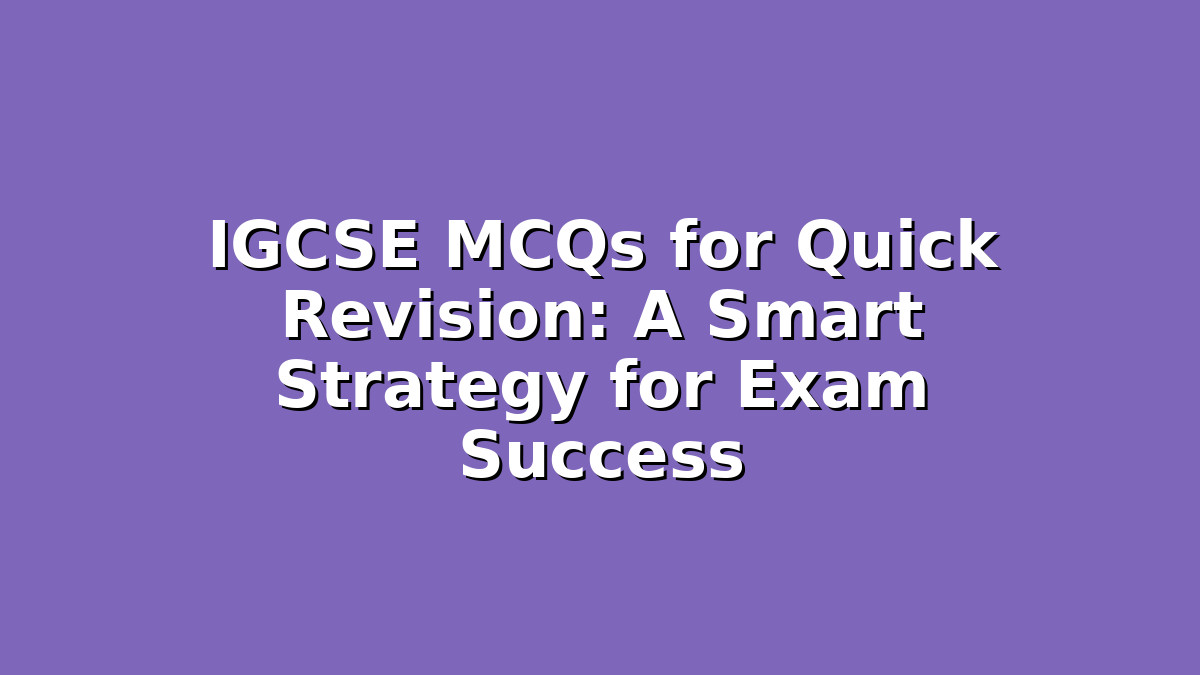Preparing for IGCSE exams can feel overwhelming, especially when you have multiple subjects to cover and limited time to revise. Many students find themselves stressed, unsure how to organize their study sessions effectively. One proven method to boost your revision efficiency and retention is using Multiple Choice Questions (MCQs). MCQs not only test your knowledge but also help you identify weak areas quickly, making them an excellent tool for quick revision.
In this article, we’ll explore how IGCSE MCQs can be your best friend during exam preparation. We’ll look at how to use MCQs effectively, how to integrate them into your study plan, and some practical tips to maximize their benefits. Whether you’re preparing for sciences, math, languages, or humanities, mastering MCQs can lead to better results and less exam anxiety.
1. Why Use IGCSE MCQs for Quick Revision?
Multiple Choice Questions are a popular format in IGCSE exams, and for good reason. They are designed to test your understanding of key concepts in a straightforward way. But MCQs offer more than just exam practice — they can transform the way you revise.
Instant Feedback and Self-Assessment: When you answer MCQs, you get immediate feedback on what you know and what you don’t. This instant assessment helps you focus your revision on weaker topics instead of wasting time on what you’ve already mastered.
Active Recall and Better Memory: Research shows that actively recalling information (rather than passively rereading notes) improves retention. MCQs force you to retrieve information from your memory, which strengthens your understanding and helps you remember it longer.
Time Management and Exam Readiness: Practicing MCQs under timed conditions prepares you for the real exam environment. It helps you manage your time effectively, improves your speed, and builds confidence in answering questions quickly without second-guessing.
Variety and Coverage: MCQs usually cover a wide range of topics, allowing you to revise broadly and prevent gaps in your knowledge. They are especially useful for subjects with lots of factual information, formulas, or definitions, such as Biology, Chemistry, Physics, or History.
2. How to Incorporate MCQs into Your Revision Plan
To make the most of MCQs for your IGCSE revision, it’s important to plan and use them strategically. Here’s how you can do it:
Start Early and Regularly: Don’t wait until the last minute to begin MCQ practice. Incorporate MCQs into your daily or weekly revision schedule. For example, after studying a topic, spend 15-20 minutes answering related MCQs to reinforce your learning.
Use Trusted Resources: Choose high-quality MCQ practice materials aligned with the IGCSE syllabus. Many textbooks, revision guides, and online platforms offer sets of MCQs that reflect the style and difficulty of the actual exam questions. Websites like Cambridge’s official resources, past papers, and revision apps are excellent places to start.
Mix Subjects and Topics: Rotate between subjects and topics to keep your revision dynamic and engaging. Doing MCQs for different subjects in one session can help you maintain focus and avoid burnout.
Analyze Your Mistakes: Don’t just mark answers as right or wrong; dive deeper into your mistakes. Understand why an answer was incorrect and revisit the related topic in your notes or textbooks. This process prevents repeated errors and deepens your conceptual knowledge.
Track Your Progress: Keep a record of your MCQ scores over time. This simple habit motivates you by showing improvement and highlights subjects or chapters that need extra attention before your exams.
3. Tips for Maximizing the Benefits of MCQ Revision
While MCQs are an excellent revision tool, they work best when combined with other study techniques and a positive mindset. Here are some tips to maximize their effectiveness:
Don’t Rely Solely on MCQs: Use MCQs alongside other revision methods such as summarizing notes, mind mapping, and practicing long-answer questions. This balanced approach ensures you are prepared for all types of exam questions.
Simulate Exam Conditions: Practice MCQs in an exam-like environment without distractions and under time constraints. This helps reduce exam-day anxiety and improves your ability to think clearly under pressure.
Review Explanations Thoroughly: When practicing MCQs, focus on understanding the explanations for both correct and incorrect answers. This helps clarify tricky concepts and prevents misunderstanding.
Join Study Groups: Discussing MCQs with friends or classmates can provide new insights and make revision more enjoyable. You can quiz each other or explain answers, which reinforces your learning.
Stay Consistent and Positive: Revision is a marathon, not a sprint. Keep a consistent routine, and don’t get discouraged by difficult questions. Each MCQ you answer correctly builds your confidence and knowledge.
Conclusion
IGCSE exams are a critical step in your academic journey, and effective revision is key to achieving the results you want. Incorporating MCQs into your revision strategy offers a smart, time-efficient way to review material, assess your understanding, and boost exam readiness. By practicing regularly, analyzing your mistakes, and combining MCQs with other study techniques, you can maximize your revision sessions and reduce exam stress.
Remember, every student’s learning style is unique, so experiment with MCQs and find a rhythm that works best for you. Stay motivated, consistent, and positive—you are capable of success!
Good luck with your IGCSE exams!

Responses